Premium Only Content
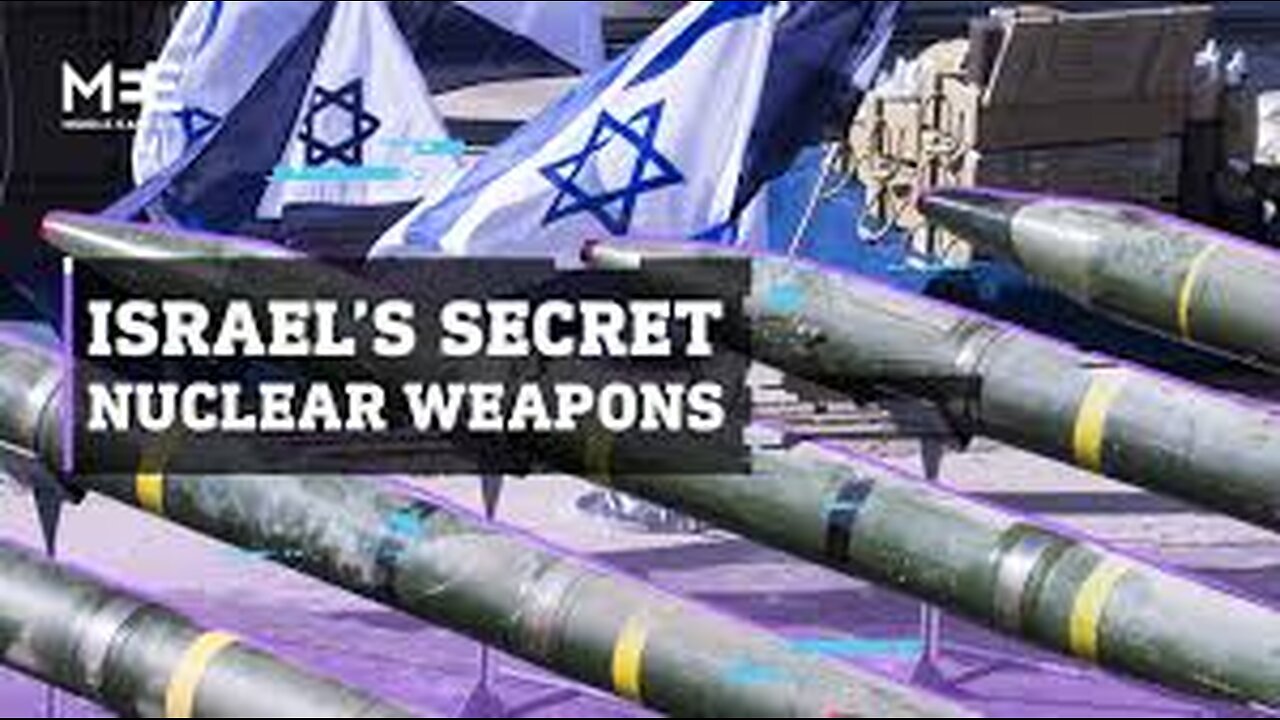
16 JUNE - What About THE NUKES Hidden in DIMONA Israel?
SLUT MIRIAM DON'T REMOVE THE VIDEO AGAIN & AGAIN & AGAIN!! YOU ZIOPIGS CANNOT PLUNDERED THE WORLD ANYMORE ESPECIALLY IN AFRICA!!
Why Netanyahu's Dream War Will be Africa's Oil Nightmare
https://www.youtube.com/watch?v=8rKjip0MyvY
Iran’s Emergency Call to Africa – Ibrahim Traoré’s Shocking Reply
https://www.youtube.com/watch?v=fU3Nog3cTlQ
Shock in Israel! Officials RENOUNCE WAR! Netanyahu in shock!
https://www.youtube.com/watch?v=-sW6uVo7C1w
FIRE! Blow to Netanyahu! Iran seizes intelligence secrets
https://www.youtube.com/watch?v=ahSfmIiV9vs
https://www.youtube.com/watch?v=bMsINGC2_BI
Satanyahu will fall as I have predicted. The demise of ‘illegal Israel’ is in the hand of SATANYAHU!!
Iran Preparing For All-Out War, Announces Big Move Amid Threat To Launch 2,000 Missiles At Israel
https://www.youtube.com/watch?v=Zvqvr5FKpaw
Khamenei Officially Announces War? Iran OPENS Bomb Shelters, 'SPOOKED' IDF Alerts Israelis | Watch
https://www.youtube.com/watch?v=zJBVVgi4wqA
Scott Ritter: LAST HOPE DESTROYED!!
https://www.youtube.com/watch?v=bfvzENLpVx8
Putin Sends Grave Warning To Khamenei After Trump Call, Leaks Chilling Israeli Plan Against Tehran?
https://www.youtube.com/watch?v=QZCRvUVLMew
=
'LIAR TRUMP': Iran FM 'Exposes' U.S. In Blistering Speech After Retaliating To Israel's Attacks
https://www.youtube.com/watch?v=f7ixfJ7eNjs
NO DEAL WITH THE 2 FACE LIAR, INSTEAD DEMAND TRUMP TO EXPOSE THE NUCLEAR FACILITY IN DIMONA?
Supreme Leader Ali Khamenei, the 2 FACE LIAR does not deserve the respect because he is not Elected but Selected and his New Angel Slut Miriam Adelson is holding his balls very tight to make sure he tolls the line. A Flip Flop president and worse a transactional one cannot be trusted and don’t forget he was the one who tore the JCPOA, do you still think you can work with such a man with NO HONOR?
From: Jew Creamer
Date: Mon, Jun 16, 2025 at 12:30 AM
Subject: Re: The Bitches REMOVED President Xi Creaming video:( - Tech Lady Update - from JC
To: Sun Wah Chong <[email protected]>, Pieface Chong <[email protected]>, Sylvia Wong
Dearest SUN,
It was one of your finest videos and glad that Sylvia could get it back on Rumble before President Xi's birthday. The Tech Lady has new information about the video from the time before the Zionist Bitches removed the video.
She found that they launched a global campaign to discredit you. They sent email blasts to millions of your viewers with video references to your love of Trump and claiming he was the savior of the world along with Xi and Putin.
According to the Tech Lady, they made a very strong case that you were responsible for Trump being elected and that you are the worst kind of hypocrite for worshiping Trump and now condemning him. It appears they had a great time at your expense and that Nevzlin, Shoshana and Michal made a complete fool out of you. There was a massive pushback on your video with millions dropping off before the 1 minute mark that would be an acknowledged view count.
Considering Trump's recent actions helping Israel on attacking Iran, the Tech Lady says that you have a lot of damage control to do if you want to repair your image. She knows this couldn't have come at a worst time for you seeing what has happened in Gaza and Trump helping Israel attack Iran, but if you want to retrieve your reputation with the 1.6 billion viewers you once had, it's going to take a major apology creaming video specifically addressing your previous love of Trump and praise for him.
She's not expecting you to do anything, but wants you to know that Miriam and her 3 bitches used your own videos and statements to damage your reputation. Even Melania Trump has been strangely silent after there was a rumor that her staff was inundated with emails showing your love and support for Donald Trump and the Bitches claims of the hypocrisy of your current positions against him. Although Melania hates him and his policies, it makes her look bad to be supportive when these millions (billions?) of emails went around the world.
I just got back from a long time on the ship and sorry to be conveying this news....I thought your video was great, my darling.
Love you forever and ever and ever, JC
=
JFK was KILLED because he didn’t want ‘illegal Israel’ to have NUKES!! If Trump really wants a DEAL, then ask him to look into the NUKES in ‘illegal Israel’? IAEA is controlled by the ZIOPIGS besides the UN so do you think Trump got the balls to do what is right for the World?
Iran says it has ‘solid proof’ U.S. forces supported Israel in attacks
https://www.youtube.com/watch?v=7EvwmCixAlc
Trump Secretly Sent 300 Hellfire Missiles to Israel That Were Used in the Attack on Iran
https://www.rumormillnews.com/cgi-bin/forum.cgi?read=255717
Iran's UNPRECEDENTED Retaliation Shocks Israel w/ Brian Berletic
https://www.youtube.com/watch?v=BjQ8UecG3D8
=
The Night Iran Crushed Israel’s Pride – And the World Stayed Silent | Piers Morgan
https://www.youtube.com/watch?v=EgjYFcRQmm4
WHY IRAN IS THE ONE COUNTRY - THE WEST CAN’T DEFEAT by Billy Graham
https://www.youtube.com/watch?v=31OOFI-VkBw
Iran's Khamenei Releases VICTORY Video | Hypersonic Turn Tel-Aviv, Haifa, Bat Yam-Israel In Ruins
https://www.youtube.com/watch?v=uodsJD-p3Go
4th Strike! Iranian Ballistic Missiles Hit Israel From Multiple Directions
https://www.youtube.com/watch?v=E2MUh3XIdhQ
What the Iran-Israel War Taught Us About U.S. Vulnerability and the Golden Dome
https://www.youtube.com/watch?v=tnBxpzIc31k
NO MUSK NO GOLDEN DOME
Tesla Pulls Out of the U.S.: Elon Musk Cancels Federal Contracts and Joins the BRICS Bloc
https://www.youtube.com/watch?v=D16VDqm4Y-E
Iran’s Wrath ‘Spooks’ Trump: ‘U.S. Had Nothing To Do With...’ — Trump Abandons Netanyahu?
https://www.youtube.com/watch?v=2gGBMcDotNM
Amidst pounding by Iran, Netanyahu seeks help from US, Trump rejects plea
https://www.youtube.com/watch?v=v60NZ46wg_A
LIVE: Iran Turns Israel's Bat Yam Into GAZA | Horrifying Footage of Iran Hypersonic Devastation
https://www.youtube.com/watch?v=rOL6BF6Y_gU
Israel's Most Devastating VIDEO Ever: Bat Yam Looks Worst Than Gaza after Iran Rains Hellfire
https://www.youtube.com/watch?v=wZWSf2btsOw
The Israelis wanted all the Palestinians dead so Now they can taste their own medicine!!
Iran's 3rd Follow-up Attack This Morning Makes Israel's Situation in Tel Aviv Tense Again
https://www.youtube.com/watch?v=XwxrlyWcls4
Iran Blitz LIVE | Ballistic Missiles Storm Israeli Skies; Bibi's Home, Hadera Power Plant 'HIT'
https://www.youtube.com/watch?v=k93rwbyF5EE
Iran BLOWS UP Israel’s Tech Brain; Missile Hits Weizmann Institute Sparks Fire In Lab | WATCH
https://www.youtube.com/watch?v=cqDbErRfM24
Israel's Haifa BURNS In Iran's Fury | Watch Moment Waves Of Ballistic Missiles SLAMMED Into City
https://www.youtube.com/watch?v=iPIe3arxN9I
A blow to the regime! Houthis seize the Israeli airport!
https://www.youtube.com/watch?v=B9sE5VFeX_k
2 minutes ago! Terrible tragedy in Israel! Residential areas are engulfed in flames
https://www.youtube.com/watch?v=g7P0KiQvlyk
KARMA or RETRIBUTION!!!!!!!!!!!
=
PALESTINE FREEDOM CREAMING
CHAPTER FOUR
Netanyahu’s Dangerous Game with Iran
In the thick fog of war talk, where generals briefed behind closed doors and foreign leaders drew red lines on global stages, a strange stillness fell over one corner of American political life. It was the kind of quiet that comes just before a voice breaks through the noise—not a new voice, but an old one. Familiar. Gruff. And utterly unafraid to go against the grain.
Pat Buchanan had been many things: a speechwriter, a culture warrior, a presidential candidate, and a conservative iconoclast. He had served under Nixon, argued with Reagan’s advisers, and challenged George H. W. Bush from the right in the 1992 primaries. Over decades, he had built a reputation as a bulldog—ferociously patriotic, unapologetically nationalist, and often controversial. But by 2012, he had become something else, too.
The world Buchanan had once known—the Cold War clarity, the borders between good and evil, the conservative movement of ideas—had shifted into something less recognizable. In the post-9/11 age, American conservatism had changed. Hawks ruled. Neoconservatives—the architects of the Iraq War—held the microphone. And into that world of militarized doctrine, Buchanan offered something almost shocking:
He was no friend of the Iranian regime. He had no illusions about the Ayatollahs or their ambitions. But what he did see was something most others chose to ignore: a pattern.
He saw it in the headlines. In Netanyahu’s speeches. In the constant drumbeat of threat and doom. And it felt familiar.
Too familiar.
“This is Iraq all over again,” Buchanan warned in column after column. “Same playbook. Same pressure. Same fear tactics.”
He remembered the early 2000s all too well. The stories about yellowcake uranium. The intelligence “slams dunks.” The foreign allies nudging America toward war while talking peace in public. He had watched that tragedy unfold. And he was determined not to watch it again.
In 2012, with Netanyahu ramping up his campaign against Iran and Congress grumbling about “unacceptable threats,” Buchanan made a statement that cut through the political fog like a blade:
“Netanyahu is trying to lead us into war with Iran.”
It was not a whisper. It was a headline.
And it landed like a thunderclap in Washington.
The comment earned Buchanan no friends in the Israeli lobby. He was already a pariah in many circles, labeled for past controversies and accused of being too sympathetic to isolationist policies. But he didn’t care. His warnings weren’t about alliances or personal favor. They were about blood. About what it meant to send American soldiers to fight another war in another Middle Eastern country.
He looked at the hawks in D.C. and saw the same cheerleaders who had sold the Iraq War. He looked at Netanyahu and saw a man playing chess with other people's pawns. And he looked at Obama—measured, slow to act, cautious—and, in a strange twist, saw something he hadn’t expected:
Buchanan wasn’t alone in this thinking, either—not entirely.
There was a quiet, often whispered, rebellion brewing inside the older ranks of the GOP. Behind the closed doors of Capitol Hill, a few seasoned
Republicans had begun to ask uncomfortable questions.
What if Iran wasn’t racing for the bomb?
What if the best way to stop them… was to talk?
It was a dangerous thought. One that could get you branded as weak, soft, even traitorous. But for those like Buchanan—who had lived long enough to see the costs of failed wars—it was necessary.
Meanwhile, in the White House, Obama and his national security team were watching the discourse unfold. They knew Netanyahu’s message was gaining traction in Congress. They knew the Israeli Prime Minister could count on allies across party lines. But they also knew the American public was tired.
After a decade of war, of flag-draped coffins and limbs lost to roadside bombs, of VA hospitals overflowing and military families breaking under the weight, the appetite for another conflict was almost nonexistent.
Obama had won the presidency on a promise to end wars, not start them.
And Buchanan’s warnings, controversial though they were, added weight to the argument the administration hoped to make—that diplomacy was not a dream, but a duty.
Inside the West Wing, the atmosphere was tense. The stakes were enormous. Every cable from the CIA, every whisper from Mossad, every fiery speech from Netanyahu pushed the pressure higher. The options were narrowing.
But just as the storm clouds began to gather in earnest, a signal arrived from the unlikeliest of places.
In 2013, the hardliner Mahmoud Ahmadinejad—the Holocaust-denying president who had screamed defiance at the West for years—was leaving office. His people were weary. The sanctions, intensified under Obama’s watch, were crushing the Iranian economy. Oil exports had plummeted. Inflation was spiraling. Even basic medicine was becoming scarce.
In his place, the Iranian people elected a man who offered a different tone Hassan Rouhani, A cleric with a doctorate in law from Scotland, Rouhani wasn’t exactly a liberal—but he was a pragmatist. He spoke the language of engagement. He promised to seek relief for the Iranian people. And, crucially, he had the backing of Iran’s Supreme Leader to try a new path—at least for a time.
In Washington, it was the first glimmer of daylight in years, Obama saw it. So did Kerry. And so did the quiet diplomats working behind the scenes.
Because while the public war of words continued—with Netanyahu drawing bombs, Buchanan warning of repeats, and pundits trading fire across television studios—something remarkable was beginning to take shape beneath the surface.
Something secret, A backchannel, It began with a whisper.
Not a headline. Not a speech. Not a press release. Just a quiet signal sent through an old friend in a forgotten corner of the Middle East.
This small Gulf kingdom, often overlooked on maps and rarely in the news, had long played a subtle role in regional diplomacy. It didn’t take sides the way Saudi Arabia or the UAE did. It didn’t thunder like Iran or strut like Israel. Instead, it listened. Observed. And when needed, it opened doors.
And in 2013, it quietly cracked one of the most impenetrable doors in modern history.
The United States and Iran had not spoken directly, meaningfully, in over three decades. Since the hostage crisis of 1979, their relationship had been defined by suspicion, sanctions, and silence. No embassies. No ambassadors. Just an endless war of proxies, rhetoric, and red lines.
But history, like nature, abhors a vacuum. And in that void, something new began to grow.
It started when a few American diplomats flew into Muscat, Oman’s sleepy capital, under the radar—literally and figuratively. No press corps. No photo ops. Just black cars, secure rooms, and hushed voices.
Their Iranian counterparts arrived discreetly, too. No officials in robes or television statements. Just suitcases, tension, and the hope of a shift.
At first, it was fragile. Awkward. The two sides had spent decades shouting at each other through layers of mistrust. Now, face to face, they had to learn to speak again.
But the moment demanded it.
In Iran, Hassan Rouhani, the newly elected president, had a mandate: lift the sanctions that were choking his country. His foreign minister, Javad Zarif, a seasoned diplomat educated in the United States, had both the trust of Tehran and the fluency of Washington.
And in the White House, Barack Obama saw a chance—perhaps the last chance—to resolve the nuclear issue without war.
Backchannels are delicate things. They survive in the shadows, away from cameras and Twitter feeds and podiums. They require trust where none exists.
And above all, they require time.
So the meetings continued. Quietly. Carefully.
For months, teams of negotiators met in hotel conference rooms and government offices in Oman. They argued over language. Over intent. Over timelines and centrifuges and the past 40 years of enmity. Every word mattered. Every comma was a potential crisis.
And slowly, something extraordinary began to happen.
They began to understand one another.
Not to agree. Not yet. But to recognize the logic of the other side.
The Americans realized that for the Iranians, the nuclear program was more than policy—it was pride. A symbol of sovereignty. A way to say: we are not Iraq, we are not Libya, we will not be bullied.
And the Iranians began to see that Obama was not Bush. That this administration, while firm, was willing to trade threats for trust—if it could be earned.
As word of the backchannel began to trickle up to the highest levels of both governments, two questions hovered over every session.
Could they stop Iran from building a bomb? Could they do it without another war?
When the talks moved from Oman to a more formal setting, it was not a retreat—it was a graduation. The secret meetings had served their purpose: they had established the possibility of trust.
Now, it was time to bring in the others.
The negotiations expanded to include the P5+1 the five permanent members of the United Nations Security Council—the United States, the United Kingdom, France, Russia, and China—plus Germany, Europe’s economic powerhouse. These nations had long been involved in trying to contain Iran’s nuclear ambitions, but always in fits and starts.
Now, under the shadow of real progress, the talks took on new urgency.
They would meet in Geneva, Lausanne, Vienna—neutral European cities steeped in history and diplomacy. The images were everywhere: long tables surrounded by tense faces, flags behind nameplates, translators whispering, cameras flashing.
But behind the stagecraft, the work remained brutal.
Iran wanted the right to enrich uranium. The West wanted severe limits. Iran wanted immediate sanction relief. The West wanted verification first. Iran wanted to keep its military sites off-limits. The West insisted on inspections.
Each side had red lines. Each side had politics. And both sides had opponents sharpening knives in the background.
In Tehran, hardliners accused Rouhani and Zarif of selling out the revolution. They warned that the Americans couldn’t be trusted—that diplomacy was a trap. Some even took to the streets, chanting “Death to America,” even as their leaders tried to find common ground with Washington.
In Washington, the backlash was just as fierce.
Republican lawmakers accused Obama of caving to the mullahs. Netanyahu warned that the talks were a sham—that Iran was playing for time. And even some Democrats expressed doubts, fearing the U.S. was giving away leverage without guarantees.
But the negotiators pressed on, because in those private rooms—in those hours of silent stares, slow translations, and whiteboards filled with technical data—a vision was beginning to take shape.
A deal. Fragile, but possible.
By late 2014, after over a year of public and private negotiations, progress was visible. Centrifuge counts were being debated. Enrichment levels mapped out. Sanctions relief schedules plotted like moon landings.
And through it all, Obama kept quiet.
He knew how easily the whole thing could collapse. He knew that one outburst, one premature statement, could send the hardliners in Tehran running—or give ammunition to hawks in Congress. So he let the process work, He trusted his diplomats.
John Kerry, his Secretary of State, had become the public face of the talks. With his long frame, sunken eyes, and raspy voice, Kerry cut a weary figure. But he was relentless. This was his war. A war for peace.
And across the table, Javad Zarif matched him move for move—charming, sharp, and unflinching. He knew the minefield he was walking. He also knew the stakes.
As 2015 dawned, the world began to hold its breath.
Could this really happen?
Could the United States and Iran, enemies for four decades, actually agree to a nuclear deal?
In Vienna, the countdown began.
The secret channel was no longer secret. The quiet hope of 2013 had become the public question of 2015.
And on both sides of the Atlantic—and both sides of the Persian Gulf—the answer would soon come.
John Kerry and Javad Zarif were not just negotiators—they were the face of two nations with histories of distrust, but also of necessity. Both men had been shaped by conflict, but each had taken a different path to diplomacy. Kerry, tall and gaunt, bore the weight of decades spent navigating war’s horrors as a Navy officer, then years fighting against it as a politician. His life had taught him one enduring lesson: war was always the last resort. When President Obama appointed him Secretary of State, Kerry knew that the negotiations with Iran would be his defining moment. And as difficult as the task was, there was a single truth he kept in mind: diplomacy was not a sign of weakness, but of strength used wisely.
For Kerry, it was the negotiation itself that became his obsession. He had the patience of a man who had seen history’s failures and learned its lessons. Every day was consumed by hours of preparation, every night spent on flights that stretched from Washington to Geneva, from Lausanne to Vienna. He would sometimes work into the small hours of the morning, his body tired but his mind never still. When a slip on a curb during a break in Geneva resulted in a broken leg, it seemed the world was conspiring against him. Yet, even as he was confined to a wheelchair, Kerry returned to the table—because failure was not an option.
And across that same table sat Javad Zarif, the Iranian foreign minister, a man of sharp intellect and fierce conviction. Zarif, with his PhD from the University of Denver and his fluency in American culture, had more in common with his American counterparts than they realized. He understood the language of the West—not just the words, but the context, the nuances, the fears that drove them. Yet he was also, unmistakably, a product of the Iranian revolution, a man shaped by the politics of Tehran and the ideological fires that had burned since 1979. To him, diplomacy was not a compromise of his country’s identity but a necessary strategy, a way to safeguard Iran’s dignity without surrendering to external powers.
Kerry and Zarif—two men from different worlds—found themselves sitting across from one another again and again, locked in deep discussions where every word, every gesture mattered. The talks were long, often intense. There were no small arguments. Every detail was contentious. The number of centrifuges Iran could retain, the stockpile of enriched uranium it could keep, the timing of sanctions relief—each was a bone of contention. And then, there were the internal battles that neither man could avoid. In Washington hardliners decried the talks as a betrayal. In Tehran, the Revolutionary Guard and Supreme Leader Ayatollah Khamenei watched with suspicion. Neither leader had full control over their side, and yet they both carried the weight of their nations on their shoulders.
But Kerry and Zarif understood something essential: failure was not just an option; it was a disaster. If the talks collapsed, it wasn’t just the nuclear issue that would suffer. The extremists would win. The moderates would be humiliated. The drumbeats of war, which had long been quieted, would grow louder. They were both tired of history repeating itself, tired of watching diplomacy die at the hands of military strikes. And so they pressed on, through the breakthroughs and the breakdowns, through the impasses and the breakthroughs, driven not by hope but by necessity.
Deadlines loomed like storm clouds on the horizon. June 30, 2015—the date they had set to reach a deal—came closer and closer, and the pressure mounted. Meetings stretched on for days, with little sleep and no guarantees. One moment, the talks were close to collapse over access to Iran’s military sites. Another time, the question of sanctions relief threatened to derail everything. But still, they persisted.
As the final hours ticked away, it felt like everything was hanging in the balance. The diplomats were weary, their suits wrinkled, their eyes bloodshot. But there was a collective realization: this was it. This was the moment that would define not just their careers, but perhaps the future of their countries. A small team, with Kerry and Zarif at the helm, worked tirelessly to close the final gaps. Then, at last, after 20 months of intense negotiations and a lifetime of experience, the agreement was signed.
The Joint Comprehensive Plan of Action, or the JCPOA, was more than just a deal—it was a testament to the painstaking work of diplomacy, the quiet patience that can hold back the tides of war. The agreement was historic, but it wasn’t perfect. There were compromises. Iran had agreed to reduce its stockpile of enriched uranium, dismantle two-thirds of its centrifuges, and allow unprecedented international inspections. In exchange, sanctions would be lifted, allowing Iran to re-enter the global economy. It was not a victory for any one side but rather a shared effort to avoid disaster.
In Vienna, there were no grand celebrations. Kerry, with his broken leg, stood by Zarif’s side as they signed the deal. There were no fireworks or cheers. Instead, there was the quiet sense of accomplishment that comes from knowing that history had been nudged in the right direction. The world watched as Obama addressed the press, his tone calm but filled with a quiet pride. He spoke of verification, of inspections, of the importance of trusting the system—not just the people involved. It was a moment of clarity, a moment of hope.
But not everyone was happy. In Israel, Prime Minister Netanyahu called it a historic mistake. In Congress, the deal was met with fierce opposition from Republicans, some of whom accused Obama of appeasing a regime that could not be trusted. In Tehran, hardliners remained skeptical, warning that the West would never truly lift its sanctions.
Yet, for a brief moment, in the hearts of those who had spent years pushing against the tide, there was a sense of peace. Not the kind of peace that guarantees a perfect future, but the kind that offers the hope of a different path—a path where dialogue and negotiation could succeed, and war could be avoided.
For John Kerry and Javad Zarif, this was not just the signing of a deal. It was the culmination of everything they had worked for, everything they had believed in, and everything they had risked. It was, for them both, a fleeting moment of peace in a world that often leaned too heavily on war.
And for the first time in a generation, the path to war had been closed—not with tanks or drones, but with words, with compromise, and with a shared belief that diplomacy was the only true way forward.
=
ONE OF MY LETTER TO SATANYAHU
Israel’s Wall Of Shame
Henry Siegman, Leading Voice of U.S. Jewry, on Gaza: “A Slaughter of Innocents”
http://sabbah.biz/mt/archives/2014/08/26/henry-siegman-leading-voice-u-s-jewry-gaza-slaughter-innocents/
The Two State solution is History; A ONE STATE is the only way forward.
1st December 2012
Dear Mr Netanyahu,
This was what I had written to you on 12 February 2012, “The Israelis have often said that the Palestinians lost their opportunity for statehood in 1948, and now I am telling you not to lose this great opportunity for your people to be fair because history will not be with you forever.” http://palestinebedrockoftheworld.com/netanyahu-real-intention/
138 COUNTRIES BEHIND THE PALESTINIAN PEOPLE AND IT IS A MATTER OF TIME THAT THE WHOLE WORLD WILL BE WITH THEM INCLUDING SINGAPORE!
BRAVO FOR THE PALESTINIAN PEOPLE, THE ROAD MIGHT BE LONG BUT WITH PERSEVERANCE THEY WILL HAVE A HOMELAND NO MATTER WHAT!!
THE PALESTINIANS WHEN ATTACK USED ROCKS TO DEFEND THEMSELVES, THIS IS CALLED COURAGE.
ISRAEL IS A COWARD BECAUSE IF YOU ARE BRAVE YOU DON'T USED DRONES TO ATTACK.
Did you not said that the Palestinians lose the opportunity in 1948 and now after they are recognized by the UN you should be happy for them because they took your advice not to lose the opportunity instead all you can say was real peace got to be negotiated. For your information the Palestinians had negotiated and have you forgotten the 1993 Oslo peace agreement? Why are you not implementing the agreement that had been agreed? Now after almost 20 years you still want them to negotiate and with YOU, you must be out of your Zionist Jew mind! Tell me why is Israel not honoring the Oslo peace agreement? If you do not know how to solve this conflict maybe you should listen to Norman Finkelstein.
After what happened recently in Gaza ISRAELIS LAUNCH MAJOR ASSAULT ON GAZA do you still believe this peace can be negotiated while you keep bombing the Palestinians and building new settlements? You think the people are so stupid to believe what you say because only an idiot like you will believe so! You have no intention to make peace with the Palestinian people because your only intention is to build a Greater Israel and that include America except now the figurehead is still an American. SO WHAT IS MISSING NOW IS A ZIONIST JEW TO BE THE COMMANDER IN CHIEF IN AMERICA. http://palestinebedrockoftheworld.com/only-if-muslims-reacted-like-this-burn-a-quran-day/
Now let me share with you what Mr Micheal Mazur got to say about Israel? http://desertpeace.wordpress.com/2010/06/12/extending-the-boycott-against-israel/
June 12, 2010 at 03:01
Three strikes and you’re out, Israel.
1/ Lebanon 06 – we all saw in stupefaction what you did there, and you were so arrogant you didn’t care that we got an eyeful, and then some, through our media, of the disfigured, charred, dismembered dead, irrespective of age or gender.
2/ Gaza 08/09 – again in stupefaction we saw the 06 in replay, just other neighbours this time, and we said to ourselves, when will this judaic nightmare stop, and to your amazement we cattle began to stir and get vocal.
3/ Peace flotilla 10 – that was the proverbial straw . . .
And now, Israel, pass your laws all you want to make internal boycotts illegal, because too many in the world now know that they too are destined to be Palestinians if nothing is done about the only nuclear power which wants to achieve unchallengeable planetary dominance through ceaselessly conspiring to bring about nuclear war between Russia and America.
Israel, you know well that nuclear winter would arise out of mutual nuclear strikes, but you are prepared to ride out the consequences with all your people in well provisioned bunkers – with the rest of us out in open dying of radiation and famine.
Vast numbers now know what they didn’t know a mere 4yrs ago that you, Israel, truly are a psychotic bunch who, by definition, cannot be reasoned with; which wouldn’t matter if you didn’t have nukes and the willingness to incinerate us all should you imagine yourself sufficiently threatened.
Israel, we have no wish to see you become extinct, just to change; because we know that psychosis in possession of nuclear weapons cannot lead to the outcome of nukes becoming inert through pro longed storage.
All this will, of course, fall on deaf ears, but try to understand that our only chance of survival (your deluded selves too) is for us cattle to progressively break off all contact with you – diplomatic, trade, investment, military, and mutual tourism.
Yes, by the last I mean to not allow any of you, from the President of Israel down, to leave Israel at all.
During this long period – may it be short, we can discuss matters like your nukes and Palestinians, and a One State Solution which would be inclusive of Palestinians having full citizenship.
When they have full citizenship, we can then discuss joint Jewish/Palestinian control of your nukes.
Think of it this way also, Israel, we all could have had explanatory travel decades ago had we not been periodically thrown into the chaos of wars instigated by you.
As it is, you too might soon be munching on radioactive dust.
Please wear your glasses to read what Mr Mazur said at this paragraph, “Vast numbers now know what they didn’t know a mere 4yrs ago that you, Israel, truly are a psychotic bunch who, by definition, cannot be reasoned with; which wouldn’t matter if you didn’t have nukes and the willingness to incinerate us all should you imagine yourself sufficiently threatened.” So now you know why the Palestinians went to United Nation to ask for a state just like Israel did in 1948.
Sunflower Chong
-

ahdedazs
2 hours ago $0.70 earnedstage gameplay
13K -
 2:06:30
2:06:30
Tucker Carlson
7 hours agoCheryl Hines: Stories From “Curb Your Enthusiasm” and Sticking by RFK on His Way to the White House
158K96 -
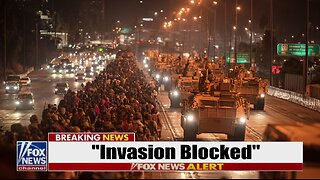 13:25
13:25
Cash Jordan
7 hours ago“INVASION” Convoy JAMS Freeway… ICE “Armored Units” FORCE Illegals BACK TO MEXICO
20.5K31 -
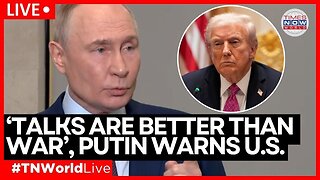 LIVE
LIVE
Times Now World
17 hours agoPUTIN PRESSER LIVE | “We Won’t Be Intimidated” — Moscow Warns U.S. After Trump’s Oil Sanctions
120 watching -
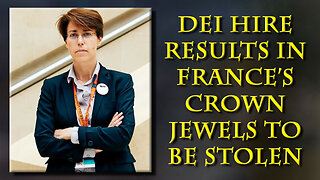 18:35
18:35
Odd Man Out
2 days agoFrance's shame of the century all for DEI pandering
25.7K96 -
 2:12:37
2:12:37
The Quartering
6 hours agoWe've Been Invaded By Low IQ Killing Machines
155K33 -
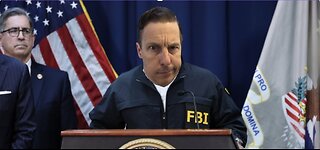 1:08:08
1:08:08
Jeff Ahern
4 hours ago $2.36 earnedFriday Freak out with Jeff Ahern
14.6K9 -
 LIVE
LIVE
Side Scrollers Podcast
1 day ago🔴SIDE SCROLLERS SUB-A-THON🔴FINAL DAY!🔴Craig Makeover + US Dart Throw + More!
1,002 watching -
 9:26
9:26
Rethinking the Dollar
8 hours agoCar Gone. Job Gone. Hope Gone? The Silent Debt Crisis In America
13.9K7 -
 2:10:21
2:10:21
The Culture War with Tim Pool
7 hours agoLeftist TERROR Attack On Coast Guard, Liberals Claim Trump Is A TYRANT | The Culture War DEBATE
150K374